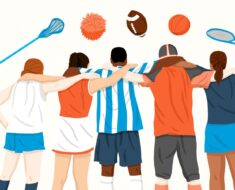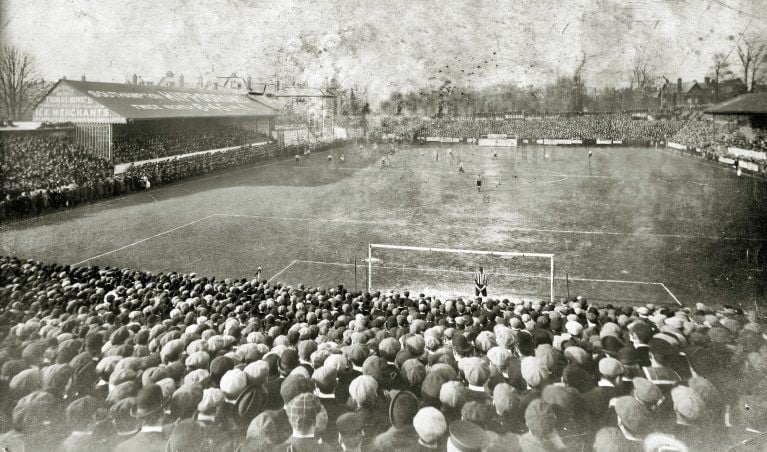Should you encourage your child to play dangerous sports with the goal of becoming a professional athlete and earning a lot of money? From the chanson or depends on the child, parent, talent, motive and opportunity. The answer is a resounding “no,” if you ask this father of four. I’ll explain more of my rationale later. For starters, caveat emptor: sports, like other businesses, have the underside of exploitation that few see or want to see. Being proactive is wise because advice given after an injury is the equivalent of medicine after death.
There are functional skills that one can acquire by playing various sports: teamwork, perseverance, determination, winning, and resilient habits. Also, playing sports can be beneficial for overall health.
Obesity is a global health problem with known consequences. Some of these consequences are high blood pressure, type II diabetes, heart disease, sleep apnea, joint disease, various types of cancer, to name a few. But don’t tell that to many Nigerians (in particular and Africans in general) who believe that being fat is a glorious thing, a status symbol, evidence of the good life and wealth. Carrying out physical activities throughout life are worthy habits that promote both the quantity and quality of life, according to health experts.
However, there is a big divide between playing sports recreationally and playing them professionally. No sport is risk free, but some are more dangerous than others. The costs of admission to the club of professional athletes may be too high; frankly, it may not be worth it.
At 20 I liked to watch boxing. The fight between Sugar Ray and Thomas “Hitman” Hearns II comes to mind. Marvin Hagler, Larry Holmes, Michael Spinks, Mike Tyson, the second coming of George Foreman were my favourites. I watched those fights every chance I got. At a 1987 Pay-View event in Oakland, California, I was sitting near a former boxer. As we left the venue after the exciting fight, he made remarks that stuck in my mind as a spectator lamented the millions the fighters earned. He said that “these fighters will pay dearly for the rest of their lives for the blows they have taken today.” He went on to say that “all the millions they made today will not be enough to cure pain and suffering for life.”
Looking back, his statements were quite prescient because little was known then about the effects of concussions, blows to the head, performance-enhancing drugs, Parkinson’s disease, memory loss, and speech impediments. Some of the sports we send our kids to play today are just as dangerous, don’t be fooled by the hype, money, fame and medical advances. Remember that beef came from a cow or as the Igbos say, “Suya ahu si n’ahu nama”!
Seeing the huge money and fame in these sports, it was only a matter of time before Nigerian parents and/or our own children started looking for the pitfalls of these sports. Some may want to reap the obvious benefits without seeing the latent pitfalls. These parents and children should adhere to this quote from Einstein: “learn the rules of the game [first]. And then you must play it better [on and off the court] than anyone else”.
I must dedicate a paragraph and pay tribute to the athletic heroes of Nigeria and indeed the world. Dick Tiger, Christian Okoye, Hakeem Olajuwon and current professional players have shown shining examples on and off the stage. They continue to be the beacon of all that is good about Nigeria and Nigerians. When was the last time you heard something negative about these heroes? Through their actions, they continue to tarnish the image of our Homeland even as corrupt politicians and the 419 are hell-bent on tarnishing its global image. As grateful Nigerians everywhere, I salute these enduring heroes.
Are these reasons compelling enough to allow your child to play dangerous sports?
I hope Nigerian parents both at home and especially abroad do not push their children into these sports for profit. Often, we are people with total tendencies to make money at all costs. Some may want to dispel a myth and end up exposing themselves and their children to hidden dangers. According to a sports journalist, “People are skeptical of Nigerian players; they are soft, not tough enough and too polite.” That is a loaded statement! Trying to “prove a negative result” can cost you dearly. You may remember Loyola Marymount basketball star Eric “Hank” Gathers, who died on the court in 1990 during a televised game. The youngster had a known heart condition, but he continued to play without taking his medications that made him too sleepy to perform at his star level.
All sports have inherent risks. As the Italians say, “ogni rosa ha le sue spine” or “every rose has its thorns”. I like to ride a bike. Many cyclists are injured and even killed while riding their bikes. Just 3 weeks ago here in Austin, Texas, a cyclist pushing his disabled bike was killed by a distracted driver less than 10 miles from my residence. Did you know that female soccer players suffer the second highest number of concussions, after female football players? Go calculate that.
However, some sports are like cigarettes: they are dangerous when practiced as prescribed. Some of the injuries are cumulative from very early ages (elementary and secondary schools) and the deleterious effects are not fully felt until after playing days are over.
The odds of becoming a professional are pretty infinitesimal. As a friend who played one of these sports professionally tells me, “People only see the few who successfully jump over the ridge. But look down into the chasm to see the crowd that didn’t make it.” The few who do become professionals end up living painful lives after their injuries begin to manifest themselves and their insurance benefits no longer exist. They quickly squander their earnings due to poor financial management skills. Just like many Nigerians refuse to plan for their retirement, these athletes think they will always have money. Those who help you waste your resources will not be there for you when you need them. The wake, if that, can only bury one after one has died, will not sustain the living.
I am not recommending that you or your children avoid amateur or professional sports. I am also not highlighting any sport. Like I said, every rose has its thorns; no sport is risk free. What I recommend is that you do your own research before exposing your family to any sport. If after all that you still feel the sport is for your child and he or she has the wherewithal to become the one in a million victor, go for it. I wish the best to your family. Beware that anything that glitters may be brass, not gold.
Ask yourself these questions:
How come so few children of professional players follow in their parents’ footsteps? Did the genes that propelled your parents to stardom suddenly “lost their way”?
Why don’t the team owners, the coaches, the team doctors use their enormous influence to get their kids into these obviously lucrative sports? Other businesses, including preachers, train their sons in the family business, why not as dangerous athletes? Is it because they tell the truth or, to paraphrase Ben Franklin, does society write harm in dust and benefit in marble?
Are sports the only way to get college scholarships? Academic scholarships are better than most athletic scholarships. The former graduates more students than the latter. Reading will not give you the aforementioned injuries.
If you don’t know of any former professional players in the sport that your child might be interested in, Google or Facebook to find one to talk to. They are relatively easy to find and you will find them willing to help you. Listen with an open mind to what they tell you; don’t take his comments as bitter comments from ex-players. That’s what I did years ago before my kids were old enough to play popular American sports. As a proactive measure, I began to discourage my children from playing soccer. I was surprised when my high school son told me he had been asked to try out for his high school team.
My wife and our children were at first jubilant with the news. I went full speed ahead to discourage him from playing football. When he refused to back down, I blessed him but told him he wasn’t going to any of the games. They said he was good at it. He convinced his mother to go to one of the games. I must inject here that she is in the medical field. After watching the game live and hearing the sounds of war… I mean the beating on the field that day, she came home to join me in discouraging our son from playing that sport. The sounds of the beating were unlike anything she hears from soccer games on television. My response was that if she thought high school players hit hard, she can imagine how hard high school and college players hit, let alone professional players. She couldn’t bear to watch my son play soccer, I just can’t. Call me chicken!
After that first year of soccer, our son announced to our delight that he was leaving the sport. I asked him why, he said that none of his team members were in their Advanced Placement classes, in fact most of them were not doing well in school, partly due to missing classes due to injuries and/or sports distractions. This is the case in Africa and elsewhere. Some excel in both sports and academics.
Thank God my son didn’t get hurt and his grades are still up. He talked about the serious injuries other footballers suffered, how they were encouraged to eat and lift more weights to get bigger, stronger, hit harder and run faster. He talked about using sub-par teams and the drive to play for college scholarships and pro prospects. Academics were not a priority, practicing and winning games were! Ultimately, he said, he discovered that we wanted what was best for him now and for the long term. He realized that we did it with and for love. And we can live with that!





